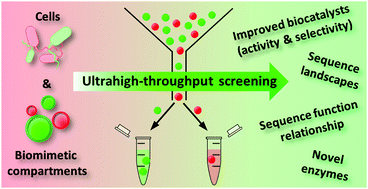当前位置:
X-MOL 学术
›
Chem. Soc. Rev.
›
论文详情
Our official English website, www.x-mol.net, welcomes your
feedback! (Note: you will need to create a separate account there.)
Advances in ultrahigh-throughput screening for directed enzyme evolution.
Chemical Society Reviews ( IF 40.4 ) Pub Date : 2020-01-02 , DOI: 10.1039/c8cs00981c Ulrich Markel 1 , Khalil D Essani , Volkan Besirlioglu , Johannes Schiffels , Wolfgang R Streit , Ulrich Schwaneberg
Chemical Society Reviews ( IF 40.4 ) Pub Date : 2020-01-02 , DOI: 10.1039/c8cs00981c Ulrich Markel 1 , Khalil D Essani , Volkan Besirlioglu , Johannes Schiffels , Wolfgang R Streit , Ulrich Schwaneberg
Affiliation

|
Enzymes are versatile catalysts and their synthetic potential has been recognized for a long time. In order to exploit their full potential, enzymes often need to be re-engineered or optimized for a given application. (Semi-) rational design has emerged as a powerful means to engineer proteins, but requires detailed knowledge about structure function relationships. In turn, directed evolution methodologies, which consist of iterative rounds of diversity generation and screening, can improve an enzyme's properties with virtually no structural knowledge. Current diversity generation methods grant us access to a vast sequence space (libraries of >1012 enzyme variants) that may hide yet unexplored catalytic activities and selectivity. However, the time investment for conventional agar plate or microtiter plate-based screening assays represents a major bottleneck in directed evolution and limits the improvements that are obtainable in reasonable time. Ultrahigh-throughput screening (uHTS) methods dramatically increase the number of screening events per time, which is crucial to speed up biocatalyst design, and to widen our knowledge about sequence function relationships. In this review, we summarize recent advances in uHTS for directed enzyme evolution. We shed light on the importance of compartmentalization to preserve the essential link between genotype and phenotype and discuss how cells and biomimetic compartments can be applied to serve this function. Finally, we discuss how uHTS can inspire novel functional metagenomics approaches to identify natural biocatalysts for novel chemical transformations.
中文翻译:

超高通量筛选定向酶进化的研究进展。
酶是多用途的催化剂,其合成潜力已被公认很长一段时间。为了充分发挥其潜力,通常需要针对给定的应用对酶进行重新设计或优化。(半)合理设计已成为工程改造蛋白质的强大手段,但需要有关结构功能关系的详细知识。反过来,定向进化方法学由迭代的多样性产生和筛选轮回组成,可以在几乎没有结构知识的情况下改善酶的性质。当前的多样性产生方法使我们能够进入广阔的序列空间(库> 1012个酶变体),这可能隐藏尚未开发的催化活性和选择性。然而,传统的琼脂板或基于微量滴定板的筛选分析所花费的时间代表了定向进化的主要瓶颈,并限制了在合理时间内可获得的改进。超高通量筛选(uHTS)方法极大地增加了每次筛选事件的数量,这对于加快生物催化剂设计和扩大我们对序列功能关系的了解至关重要。在这篇综述中,我们总结了用于定向酶进化的uHTS的最新进展。我们阐明了区室化对于保持基因型和表型之间必不可少的联系的重要性,并讨论了如何利用细胞和仿生区室来实现这一功能。最后,
更新日期:2020-01-02
中文翻译:

超高通量筛选定向酶进化的研究进展。
酶是多用途的催化剂,其合成潜力已被公认很长一段时间。为了充分发挥其潜力,通常需要针对给定的应用对酶进行重新设计或优化。(半)合理设计已成为工程改造蛋白质的强大手段,但需要有关结构功能关系的详细知识。反过来,定向进化方法学由迭代的多样性产生和筛选轮回组成,可以在几乎没有结构知识的情况下改善酶的性质。当前的多样性产生方法使我们能够进入广阔的序列空间(库> 1012个酶变体),这可能隐藏尚未开发的催化活性和选择性。然而,传统的琼脂板或基于微量滴定板的筛选分析所花费的时间代表了定向进化的主要瓶颈,并限制了在合理时间内可获得的改进。超高通量筛选(uHTS)方法极大地增加了每次筛选事件的数量,这对于加快生物催化剂设计和扩大我们对序列功能关系的了解至关重要。在这篇综述中,我们总结了用于定向酶进化的uHTS的最新进展。我们阐明了区室化对于保持基因型和表型之间必不可少的联系的重要性,并讨论了如何利用细胞和仿生区室来实现这一功能。最后,











































 京公网安备 11010802027423号
京公网安备 11010802027423号